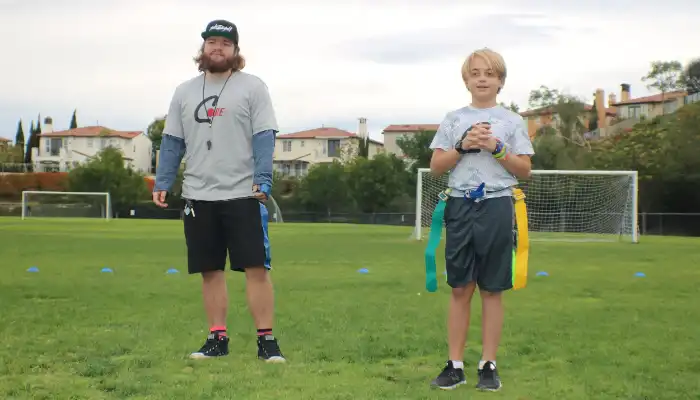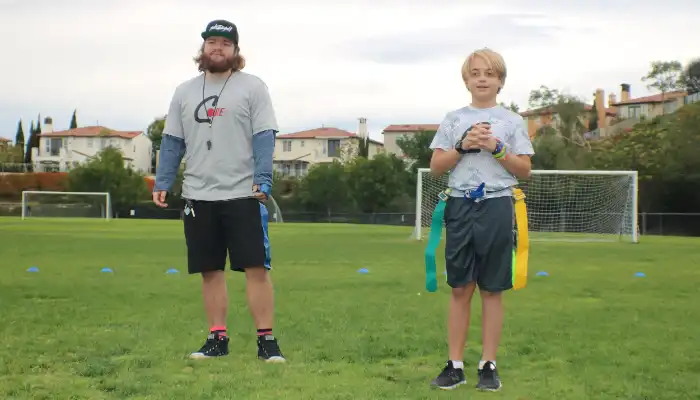
Even if the season is over, that doesn’t mean that your fitness has to end. Athletes require this off-season period for them to recover from fatigue and get ready for future games. Trying to stay motivated during this time can be difficult. Competition is in the past while training may seem like a bore.
This article gives you strategies on how to conquer the off-season and come out stronger, healthier, and more determined than ever before.

Know Your “Why”: Setting Goals for Success
Any successful off-season program starts with having clear goals. Here’s why:
- Direction and Focus: Goals provide a roadmap for your off-season training. Use them to know what workouts should be prioritized, track your progress, and stay on course.
- Motivation and Inspiration: Goals give you something to strive for. Knowing what you are working towards will help you stay motivated throughout the off-season period.
Crafting Effective Goals:
- Specificity is Key: Rather than saying “get in shape,” set goals that are specific and measurable; improve squat weight by 10%, run a certain time in a 5K race or increase vertical jump by some inches.
- Short-Term Wins: Split long-term objectives into smaller, achievable milestones. It helps one remain determined as well as acknowledge advancement made along the way. For example, if your goal is to run a faster 5K, set short-term goals like improving your running distance by a certain amount each week.
- Adaptability is Essential: You don’t have any choice but to accept changes since life keeps happening even when setting goals. Therefore, always feel free to revisit or redefine your objectives whenever necessary.
Spice Up Your Routine: Embrace the Power of Variety
During the summer months when there are no competitive games or matches taking place, it is important to adopt different techniques of practicing sports so as not to make it monotonous. Here’s how variety can benefit your off-season:
- Combating Boredom: Doing the same exercises every day can quickly become monotonous. Try new activities to keep you excited and engaged on your fitness journey.
- Preventing Injuries: Repetitive strain from the same exercises can lead to overuse injuries. Instead, cross-train by doing other activities that work different muscles and reduce the risk of injury.
Unleashing Variety:
- Explore New Activities: Have always wanted to try rock climbing, swimming, or even a dance class? Give yourself an opportunity in this period of no games but just learning at whatever pace you want.
- Embrace Cross-Training: Cross-training involves incorporating activities different from your primary sport. For instance, a runner might integrate swimming for low-impact cardio and improved upper body strength.
- Make it Fun: Don’t take yourself too seriously. Look for things to do that are genuinely fun for you! The more enjoyable it is, the more likely you are to continue doing them.
Find Your Partner in Fitness: The Power of Teamwork
When many people are willing to help with motivational messages it becomes easier than when one does it alone. Here is how the training buddy helps:
- Accountability Partner: A good training partner makes sure you get up in the morning and put everything into the workout routine. They will be able to push you harder during tough times and also celebrate together with you when everything goes right.
- Motivation Boost: When things aren’t going well and motivation levels are low then that’s where a training buddy comes in handy; they provide moral support as well as share in challenges faced during challenging workouts too!
- Shared Success: It is possible to train with a friend and feel comradeship. The satisfaction of witnessing each other’s milestones and achievements is an excellent stimulus that keeps us going.
Finding the Perfect Partner:
- Compatibility is Key: Find someone who shares your fitness goals.
- Communication is Essential: Be open with your buddy about your schedules and goals, never assuming they will develop alongside yours.
- Make it Fun: Choose a partner you enjoy being around. Your workout sessions must be challenging but pleasurable.
Envision Your Victory: The Power of Visualization
Visualization remains a powerful tool for motivation and performance enhancement.
- Mental Rehearsal: This involves picturing yourself achieving your success. For instance, visualize yourself as you achieve your off-season objectives and also perform at the peak during the forthcoming season.
- Boosted Confidence: By visualizing success, you build up confidence in yourself. This positive attitude translates into better training and competition performances.
Making Visualization Work for You:
- Create a Vision Board: Collect images or words that represent your goals. Having them displayed where you can see them daily works as a constant reminder of why you work hard every day in life towards them.
- Journal Your Successes: Journaling is quite powerful because it enables individuals to not only write down their goals but also picture exactly how they should look when achieved. You can wait until you reach your target so that you can write how exultant you will feel at that moment. Revisiting this journal regularly reinforces your resolve and acknowledges the progress made thus far, often too little noticed by others.
Focus During Workouts:
If you are faced with a demanding exercise, shut your eyes imagining yourself completing it successfully. Focus on the feeling of accomplishment, noting down every step you make towards reaching these targets in life or growing into a better person than before.
Tracking Your Progress: Celebrate the Journey
Staying motivated requires seeing tangible signs of progress. Here’s how tracking your progress fuels your off-season drive:
- Training Log or Journal: A log book or diary that keeps a record of your exercises, repetitions, and sets. When you assess your performance in this way, you’re able to see how far you’ve come and those areas in which you need improvement.
- Celebrate Small Victories: You should also take time and celebrate the attainment of even the smallest objectives. Did they finally master some new workout? Or did they manage to run greater distances than ever before? Celebrate such moments as well! Realizing what one has accomplished so far makes one more driven towards positive training habits.
- Monitor Performance and Fitness Levels: Find out where each athlete stands through timed runs, weightlifting tests, or fitness assessments offered by gyms or trainers. For example, when you can observe real improvements in strength, speed, or endurance it is always a great driver for moving forward.
Cultivating a Champion’s Mindset: Positivity is Power
A positive mindset is crucial for staying motivated throughout the off-season. Here are some ways to cultivate a champion’s mentality:
- Positive Self-Talk: Replace negative internal dialogues with positive assertions like “Every day I become stronger.”
- Focus on Progress, Not Perfection: One gets better at something by progress, not perfection and there will be times when one falls behind or misses workouts but only an individual who has made significant steps towards improvement can appreciate it.
- Gratitude for Your Body: Rather than how one looks like as long as exercise makes them feel stronger and healthier.
The Power of Rewards: Celebrate Your Achievements
Rewards can be a fantastic tool to reinforce positive training behaviors and maintain motivation. Here’s how to use rewards strategically:
- Milestone-Based Rewards: Set up rewards for achieving milestones of your off-season training plan. It can be a new piece of workout gear, a massage, or an outing with friends.
- Alignment with Goals: Rewards should be selected in accordance with the overall health and fitness goals. A new pair of running shoes would make a great reward for hitting a running mileage goal but not going out.
- Motivation, Not Dependence: Rewards are meant to motivate you to keep striving forward and not become crutches. Do not depend on rewards only to get yourself through exercises.
Rest, Recover, and Recharge: Prioritize Recovery
However important it is for one to push himself/herself sometimes ignoring rest and recovery can adversely affect your progress. That’s why recovery is critical for off-season success:
- Importance of Rest: Letting your body repair muscle tissue, replenish energy stores, and prevent injury. Inculcate rest days in your training program and prioritize quality sleep.
- Active Recovery Activities: Incorporate low-impact activities like yoga, light swimming, or foam rolling into your rest days to facilitate circulation also helping in assisting with the healing process.
- Listen to Your Body: Avoid pain or fatigue at all costs. Keep pushing through injuries because it will set you back. Get to know when you need some time off by paying attention to what the body is telling you.
Reflect and Adapt: A Continual Process
To optimize your off-season training, regular reflection is necessary. This will ensure that your plan remains effective:
- Regular Reflection: Set aside time now and then to reflect upon your journey as far as training is concerned – are you reaching targets? Are workouts enjoyable?
- Identify What’s Working (and What’s Not): Be truthful about which parts of the training schedule work well and which ones require minor changes.
- Make Adjustments: Be not afraid to make changes in your training program whenever necessary – As you get fitter, you may need to raise the intensity or duration of your workouts.
Conclusion
The off-season should not be a time of slowdown! It is the best time for setting objectives, changing your routine, and training with a friend. Think about succeeding, follow the route of self-improvement, and stay confident. At least, celebrate successes, take regular breaks, and adjust your strategy where necessary. Remember that in general terms this means doing it every day! These tactics will help you to get through the out-of-season successfully and you’ll come out of it as a stronger more inspired athlete.
